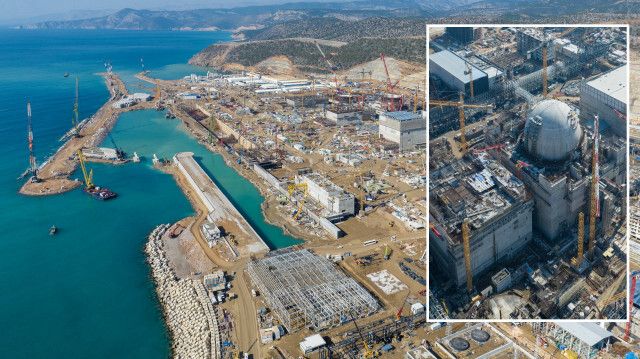Akkuyu NPP to contribute energy supply security

Following the announcement by the Ministry of Energy and Natural Resources that Turkiye's nuclear power target is 7.2 GW by 2035 and 20 GW by 2050, all eyes have turned to the Akkuyu Nuclear Power Plant. Cihad Terzioğlu, Vice President of the Independent Industrialists and Businessmen Association (MÜSİAD), stated that nuclear energy and the Akkuyu Nuclear Power Plant (NPP) will make significant contributions to energy supply security.
He noted that the plant, with its first unit nearing completion, will advance Turkiye in various areas, from energy diversity to mitigating the effects of climate change, and added that he believes that nuclear power plants established in Turkiye, especially Akkuyu NPP, will contribute to reversing brain drain as well as provide economic and technological gains.
The Ministry of Energy and Natural Resources announcement has shifted focus to Akkuyu NPP, which experts describe as a "turning point in Turkiye’s energy journey." This initiative is the first step toward long-term goals, with additional reactors planned for Sinop and Thrace, and the development of small modular reactors (SMRs) expected to add around 5 GW. Terzioğlu highlighted that the rapidly progressing first unit of the plant will offer significant advantages to Turkiye, stating, "Considering the energy bill within the current account deficit, Akkuyu NPP, which will meet approximately 10 percent of our electricity needs, is of great economic importance. Beyond these benefits, I believe the nuclear energy sector will also significantly contribute to Turkiye's technological advancements."
Terzioğlu also discussed the potential for a reverse brain drain.
"Nuclear energy technology will boost sectors such as medicine, chemistry, and machinery. This contribution will be sustainable with a growing qualified workforce and job creation thanks to nuclear technology. With many nuclear energy and physics engineers considering opportunities abroad, Turkiye could see a reverse brain drain due to nuclear energy plants. The introduction of nuclear energy technology with Akkuyu will also diversify our energy supply.
Given the increasing need for clean energy due to the eventual decommissioning of fossil fuel power plants and carbon regulation mechanisms, Akkuyu and a total nuclear energy capacity of 10-15 GW will be crucial for Turkiye’s energy security and climate goals. Turkiye, adhering to its National Energy and Mining Policy since 2016, emphasizes localization while ensuring energy supply security. The development of factories, production lines, and sub-industries for wind and solar technologies from renewable energy sources exemplifies this approach.
We will also experience the positive impacts of the nuclear power plant in this regard. This technology, involving tens of thousands of pieces of equipment and numerous services in the supply chain, will create its ecosystem. This ecosystem will span from manufacturing and sub-industries to engineering and administrative services. Companies and institutions gaining experience in this ecosystem will also be positioned to provide services to nuclear power plants abroad, potentially boosting our export power. Additionally, nuclear energy technology will advance developments in electric vehicles, storage, and hydrogen technologies, which will become more prominent in the future."
"SMR technology has reached the commercialization stage," Terzioğlu added.
"Small modular reactor (SMR) technology, which follows conventional nuclear energy methods, has reached commercialization. I anticipate it will be favored in the coming years due to its easy installation, decommissioning, and advantages in waste and fuel processes. I believe the heavy industry will be particularly interested in SMR solutions ranging from 30 MW to 300 MW. It is crucial to develop financing opportunities to accelerate SMR technology investments and ensure it is included in global incentive mechanisms for combating climate change."
Altuğ Karataş, a Board Member of the Energy Efficiency Association, stated that the experience Turkiye gains from building nuclear power plants will provide a significant advantage in developing small modular reactors (SMRs). He noted that the world is rapidly advancing in the field of SMRs, which are poised to become a new source of production in the transition to carbon-free energy.
"This new market, driven by key players such as Rosatom, the Russian State Nuclear Energy Corporation that constructed Akkuyu NPP, has the potential to accelerate the shift to a new production model in the energy sector. This can be achieved through the legislative infrastructure and ecosystem development that countries will implement. The production experience Turkiye acquires from constructing nuclear power plants will also be a major asset in the transition to SMRs."
Here we are to serve you with news right now. It does not cost much, but worth your attention.
Choose to support open, independent, quality journalism and subscribe on a monthly basis.
By subscribing to our online newspaper, you can have full digital access to all news, analysis, and much more.
You can also follow AzerNEWS on Twitter @AzerNewsAz or Facebook @AzerNewsNewspaper
Thank you!
